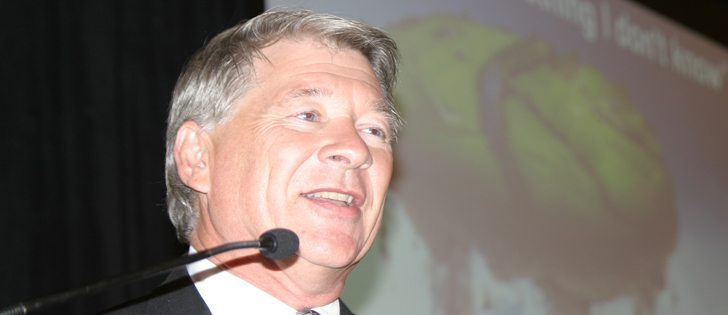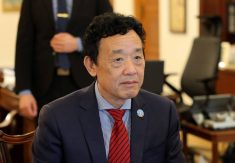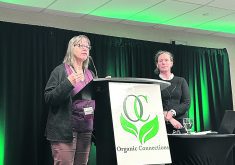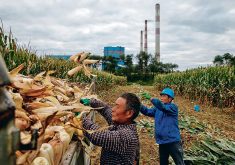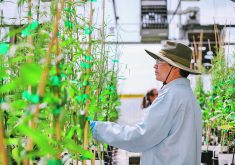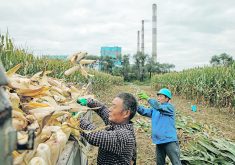Robert Saik’s goal is to make everyone informed about GMOs before they take a stance on them.
The CEO of Agri-Trend is currently working on making Know GMO, a documentary movie about GMOs, telling both sides of the story including the anti-GMO side. Yesterday he gave a lecture at the University of Saskatchewan about GMOs and his movie.
“There’s so much disinformation, so much misinformation out there, it’s important for (consumers) to understand that GMOs are all around us,” Saik said.
Saik sees the non-science movement as the greatest threat to global food security. He has observed anti-GMO groups campaigning to stop technology that could potentially help people who are starving in places like Africa.
He believes that the problems that producers are dealing with about GMOs are due to First World worries about the effects of GMOs, even though they don’t completely understand them.
In the lecture, Saik said genetic modification is nothing more than a progression of plant crop breeding that has been happening for centuries. The process now is just being sped up through other technologies.
Hawaii had one of the first commercially successful GM crops, the rainbow papaya.
During the 1980s, the ringspot virus was destroying papaya trees in Hawaii. Trees across the islands were getting chopped down and there was no cure for the plant disease.
Dennis Gonsalves and his team at Cornell University invented the rainbow papaya by splicing a small amount of the virus into the plant and creating immunity against it. By doing this they resurrected the papaya industry in Hawaii.
At the time people were happy with this but now the tone has changed.
Read Also

Farming Smarter receives financial boost from Alberta government for potato research
Farming Smarter near Lethbridge got a boost to its research equipment, thanks to the Alberta government’s increase in funding for research associations.
“Now we have a whole bunch of people campaigning against GMOs, wanting farmers to cut down their plants and go organic,” Saik said.
“What’s going to happen is the virus will be back and there will be no papaya industry in Hawaii. People have short memories.”
Andrea De Roo, a farmer and master’s student in weed sciences, was pleasantly surprised by the tone of Saik’s lecture.
“I came in expecting it to be very pro GMO … but I was pleasantly surprised to see that (Saik) included talks about organic, and he actually does promote the organic practices that a lot of farmers are already using but the public doesn’t know that they use,” De Roo said.
Saik also gave an update on the documentary project. The group has already filmed in Kenya, Uganda, South America, North America and Hawaii. It is now looking to start the production stage.
However, the project still needs more funding to finish the film. It has raised more than $800,000 but estimates it will cost $1.2 million to $1.4 million in total.
“We’ve got a lot of the footage and the filmmaking done. Now we’ve got to enter in production, and so we’re still actively campaigning (for money),” Saik said.
Attendees of the lecture were treated to a few clips of footage from the documentary. Saik is hoping Know GMO will be released in 2016.
Contact ashley.robinson@producer.com



